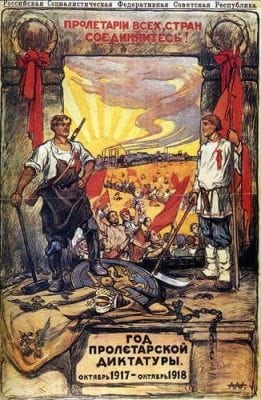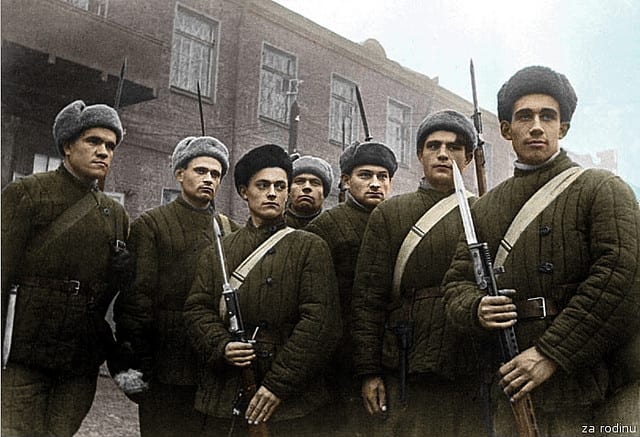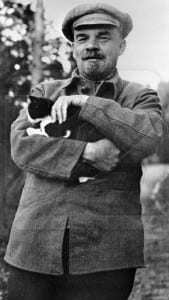Lenin: State and Revolution (Lenin 5)
![]() Dispatches from
Dispatches from
GAITHER STEWART
European Correspondent • Rome
“The state is an organ of class domination, an organ of oppression of one class by another; its aim is the creation of ‘order’, which legalizes and perpetuates this oppression by moderating the collisions between the classes…”
The Marxist Theory of the State and the Tasks of the Proletariat in the Revolution
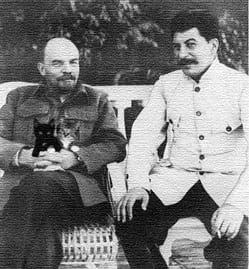
Lenin, kittens, and Stalin, no less. The anti-Stalin gang has consistently misrepresented Lenin’s views on Stalin.
State and Revolution, published in 1918, is the core of Vladimir Ilyich Ulyanov or Lenin’s political thought. As if dictated by Lenin’ fate, the long work was written in 1917, three months before the October Revolution, on the very eve of the revolution which he was instrumental in bringing about and was in fact interrupted by the Bolshevik seizure of power in Russia. Seldom has an aphorism been timelier than Lenin’s: “It is much more pleasant and useful to go through the experience of the revolution than to write about it.” In this work of 110 pages in his collected works (73 pages in an English language Ebook format available online), Lenin develops his views on the nature of the state as an instrument of class oppression and the necessity of revolution to change things, after which he proceeds to examine the stages of the transition from capitalism to communism. In the present article about State and Revolution I have used to a great extent the same (often heavy but highly emotional and descriptive) words and expressions and stuck to Lenin’s style as much as I thought proper.
As Lenin farsightedly noted—an undermining practice continuing also today perhaps even to a greater degree than in Lenin’s time—the bourgeoisie, opportunists in the labor movements and I would add the intellectual classes, especially liberal academics, devote much time and effort to adulterating Marxism, “omitting, obliterating and distorting the revolutionary side of its teaching, its revolutionary soul. They push to the foreground and extol what is, or seems, acceptable to the bourgeoisie….” Therefore, Lenin writes that his first aim in State and Revolution is “to resuscitate the real teaching of Marx on the state.
“The state,” Lenin writes in reference to the essence of the words of Marx, “is the product and the manifestation of the irreconcilability of class antagonisms. The state arises … to the extent that those class antagonisms cannot be objectively reconciled. And, conversely, the existence of the state proves that the class antagonisms are irreconcilable.” Bourgeois ideologists, Lenin points out, accept the state’s existence where there are class antagonisms, but revise Marx in such a way as to make it appear that the state exists to reconcile classes. Thus, the bourgeois state is the good, its role being to moderate and reconcile the classes—today, for example, to reconcile the differences between the 0.00001 % and the impoverished classes in the USA for whom even food stamps are unnecessary, for whom free health care and proper education are dispensable and besides smack too much of the hated socialism.
According to Marx, Lenin writes, “the state could neither arise nor maintain itself if a reconciliation of classes were possible.” In reality, the state is an organ of class domination, an organ of oppression of one class by another; its aim is the creation of ‘order’, which legalizes and perpetuates this oppression by moderating the collisions between the classes;… to moderate collisions does not mean (claim petty-bourgeois and philistine professors and publicists) … to deprive the oppressed classes of … the means and methods of struggle for overthrowing the oppressors, but to practice reconciliation.”
In the case of the Russian Revolution of 1917, the meaning and role of the state arose and demanded action on a mass scale, But there, Lenin writes just at the time when this was happening, many left-wing Socialist revolutionaries embraced the petty-bourgeois theory of reconciliation of the classes by the state. That is all they wrote about, reconciliation, reconciliation. This petty-bourgeois class is never able to understand—precisely the same today—that the state is an organ of domination of a definite class which cannot be reconciled with its antipode (the class opposed to it).
SPECIAL BODIES OF ARMED MEN, PRISONS, ETC.
[dropcap]R[/dropcap]eferring often to Engels, Lenin writes that civilized society is broken up into irreconcilably antagonistic classes, which, if armed would come into armed struggle with each other. However, a state creates a special power in the form of special bodies of armed men (the army and police), and every revolution, by shattering the state apparatus, demonstrates to us how the ex-ruling class aims at the restoration of these special bodies of armed men (Lenin here is apparently speaking of counterrevolutionary action like the Whites” in the Russian civil war yet to come after the Bolshevik seizure of power. Foresight!) and how the oppressed class tries to create a new organization of this kind, capable of serving not the exploiters, but the exploited. In this case, the army of the oppressed people. The kernel of the Red Army. The army of the post-revolution against the reaction sure to come.
THE STATE AS AN INSTRUMENT FOR THE EXPLOITATION OF THE OPPRESSED CLASS
At this point, Lenin concentrates on the power wielded by the state’s officials, from the “shabbiest police servant” to the head of the military arm, as explained by Engels who places state officials as “organs above society”, which permit the dominant class to hold down and exploit at will the oppressed class just as ancient and feudal states were organs of exploitation of the slaves and serfs. However, not only ancient states, but also the Bonapartism of the First and Second Empires in France, the Bismarck regime in Germany, the Kerensky government in the Russia Lenin that was about to overthrow, and how much more so in the unrestrained power of those “above society” (unchecked militarized police and top secret agencies) in the USA today.
Engels had written that in the first place, on the assumption of state power, the proletariat “puts an end to the state as the state.” Engels means the destruction of the bourgeois state by the proletarian revolution. Engels added that the state itself is a “special repressive force.” Therefore, the special repressive force maintained by a handful of the bourgeoisie for the suppression of the (masses of) proletariat must be replaced by a “special repressive force” of the proletariat for the suppression of the bourgeoisie (and the establishment of the dictatorship of the proletariat). The reader must not be mislead by Lenin’s extensive quotes from the work of the great revolutionary Friedrich Engels; he uses them in order to express pure Leninist views.
The revolution constitutes the destruction of “the state as the state.” It is the seizure of the means of production in the name of society, The so-called “withering away of the state” refers to the period after the socialist revolution. Engels, Marx and Lenin attempt to define the form of society which will replace the crushed bourgeois state as well as the form of proletarian statehood or the democracy that remains after the revolution. But since democracy is also a state it too must eventually go. The bourgeois state is first crushed and done away with, then, what “withers away” after the revolution is the proletarian semistate. It is the state in general, the idea of the state (as a repressive force, remember, that is to wither away. The whole point of Marx. Engels and Lenin, is the justification, no, the necessity of revolution to change things, since the bourgeois will never, never “wither away” on its own. It must be crushed and eliminated by a violent revolution.. The idea of the absolute necessity of violent revolution to eliminate the bourgeois state is the heart, the core, of the thinking of Marx, Engels and finally Lenin.
TRANSITION FROM CAPITALISM TO COMMUNISM
[dropcap]L[/dropcap]enin quotes Marx: “Between capitalist and communist society lies the period of the revolutionary transformation of the former into the latter. To this also corresponds a political transition period, in which the state can be no other than the revolutionary dictatorship of the proletariat.”
This conclusion is based chiefly on the irreconcilability of the bourgeoisie and the proletariat. Now the question arises as to how the transition from the old to the new society can proceed. Lenin too writes that the transition from a capitalist to a communist society requires a “political transition period”, and the state in this period can only be the revolutionary dictatorship of the proletariat.
Lenin notes in this text that “it is said that the class struggle is the main point of Marxism. That is wrong. The theory of the class struggle was created by the bourgeoisie before Marx. The true Marxist extends the class struggle to the dictatorship of the proletariat. That is the most perfect distinction between a Marxist and the ordinary petty (and the big) bourgeois.”
Lenin then asks what the relation is between this dictatorship to democracy. The answer lies in the changes democracy has undergone during the transition to communism. Although we have almost complete democracy in the democratic republic, he says, this democracy is bound by the narrow framework of capitalist exploitation. Therefore it remains a democracy for the minority (for an ever more restricted minority in capitalist states today (if what remains for them can be legitimately called democracy), only for the rich, only for the possessing classes, which Lenin compares to the democracy of ancient Greeks limited to slave owners, while in modern times the democracy, in which wage slaves hardly participate, has no meaning. It means nothing to them. Thus, Lenin concludes: “democracy for an insignificant minority, democracy for the rich—that is the democracy of capitalist society.” Especially the American reader might ponder Lenin’s conclusion of one hundred years ago. He notes that if one looks at some of the details of the suffrage (residential and registration requirements), the working of the representative institutions, press freedom, etc., we see on all side restrictions after restrictions of democracy, which effectively eliminate the masses from politics and a share in democracy. Marx too, over one hundred years ago, noted the sham and the irony of every few years allowing the oppressed to decide which particular representatives of the oppressing class should be in parliament to represent and oppress them.
So the progress of capitalist democracy does not march smoothly onward to greater and greater democracy. No! Lenin pronounces, “Progress marches onward toward communism, through the dictatorship of the proletariat (achieved by violent revolution); it cannot do otherwise, for there is no one else and no other way to break the resistance of the capitalist exploiters. To provide genuine democracy to the poor, for the people, and not for the rich, the dictatorship of the proletariat applies a series of restrictions on the oppressors, on the exploiters. We must crush them in order to free humanity from wage slavery. There is no other way.”
So the modification of democracy during the transition from capitalism to communism is that it is a democracy used to crush the capitalist antagonists. Democracy for the great majority of people and suppression of the exploiters and oppressors, such are the task of the revolution and the new society.
The splendid future society, the Utopian ideal, the worker with head high and shining eyes looking forward to the splendid future depicted on crude early Soviet posters of the time when men and women now freed from the horrors of capitalist oppression and exploitation and indignation have become accustomed to the elementary rules of social life, the time when the state as such can begin to “wither away”, to modern readers smacks of hyperbolic, old-fashioned propaganda, today, in the time of subtle, cradle-to-the-grave brainwash. And Lenin’s last words in State and Revolution, written a century ago will sound like a fairy tale to people busy making money, to the elite of capitalist society. It would be preferable if the images created by Marx and Engels and Lenin appeared at least chimerical. It might surprise readers to learn that a recent survey in Russia shows that over fifty per cent of Russians would like a return to the Soviet Union. Most certainly not the elite, but the poor and the exploited and oppressed today in much of the world and I believe also in the USA would perceive hope in such words and images in Lenin’s State and Revolution. Yes, I believe so.
IN THE SERIES:
Lenin on Compromises (Lenin 1)
Lenin on Tactics of the Democratic Revolution (Lenin 2)
Lenin: The Working Class as the Vanguard Fighter for Social Democracy (Lenin 3)
Lenin on Imperialism and Capitalism (Lenin 4)
![]()
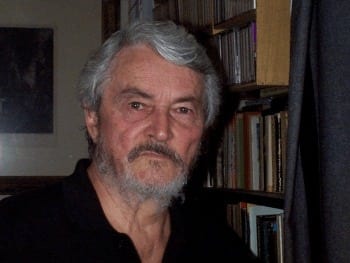 Our Senior Editor based in Rome, serves—inter alia—as our European correspondent. A veteran journalist and essayist on a broad palette of topics from culture to history and politics, he is also the author of the Europe Trilogy, celebrated spy thrillers whose latest volume, Time of Exile, was recently published by Punto Press.
Our Senior Editor based in Rome, serves—inter alia—as our European correspondent. A veteran journalist and essayist on a broad palette of topics from culture to history and politics, he is also the author of the Europe Trilogy, celebrated spy thrillers whose latest volume, Time of Exile, was recently published by Punto Press.
=SUBSCRIBE TODAY! NOTHING TO LOSE, EVERYTHING TO GAIN.=
free • safe • invaluable
[email-subscribers namefield=”YES” desc=”” group=”Public”]
